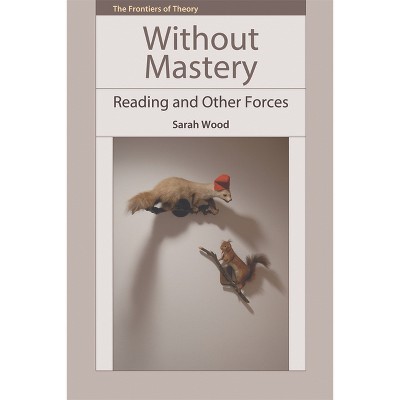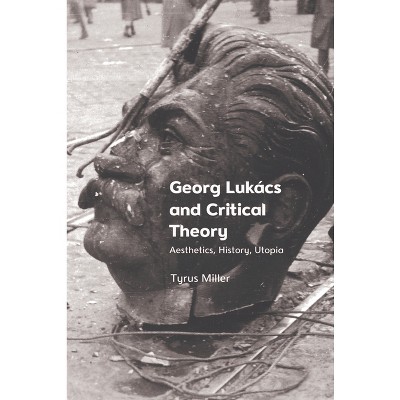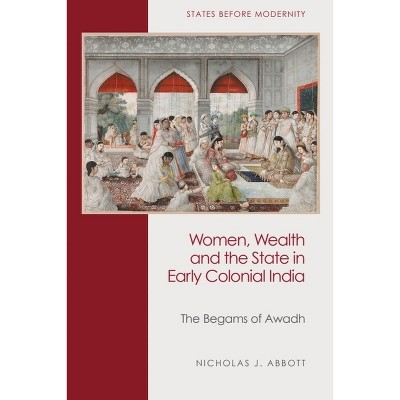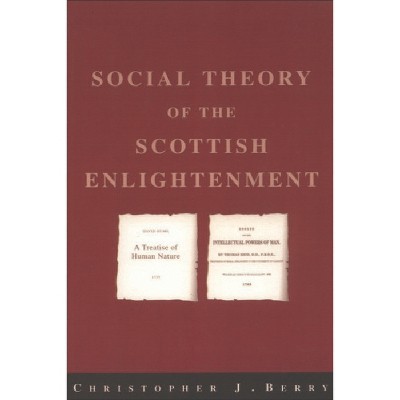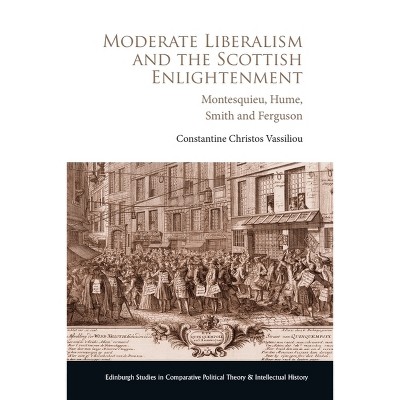Sponsored

Veering - (Frontiers of Theory) by Nicholas Royle (Paperback)
In Stock
Sponsored
About this item
Highlights
- Brilliantly traces a strange but compelling 'literary turn'Exploring images of swerving, loss of control, digressing and deviating, Veering provides new critical perspectives on all major literary genres: the novel, poetry, drama, the short story and the essay, as well as 'creative writing'.
- About the Author: Nicholas Royle is Professor of English at the University of Sussex.
- 232 Pages
- Literary Criticism, Semiotics & Theory
- Series Name: Frontiers of Theory
Description
About the Book
Exploring images of swerving, loss of control, digressing and deviating, Veering provides new critical perspectives on all major literary genres: the novel, poetry, drama, the short story and the essay, as well as 'creative writing'.
Book Synopsis
Brilliantly traces a strange but compelling 'literary turn'
Exploring images of swerving, loss of control, digressing and deviating, Veering provides new critical perspectives on all major literary genres: the novel, poetry, drama, the short story and the essay, as well as 'creative writing'. Royle works with insights from Lewis Carroll, Freud, Adorno, Raymond Williams, Edward Said, Deleuze, Cixous and Derrida. With wit and irony he investigates 'veering' in the writings of Jonson, Milton, Dryden, Wordsworth, Coleridge, Melville, Hardy, Proust, Lawrence, Bowen, J.H. Prynne and many others.
From the Back Cover
'Giving us a brilliantly provocative model of how a text can be discussed....This book will prove greatly productive for literary studies. Always surprising, it is its own best example of how critical curiosity and attention should veer about, turning up wonderful and unthought of things.' Times Literary Supplement 'This fascinating, richly compendious, necessary book shows the way forward for literary studies. Royle is a wonderful communicator about literature and theory and a uniquely powerful, original critical voice. This is his most exciting and widely relevant work so far.' Sarah Wood, University of Kent 'Reading Veering generates the intense joy of veering. An exuberantly successful medium, Royle calls up swarms of passages from literature and elsewhere where the word or concept veering is salient. On this basis he creates new theories of literature and of creative writing's place in criticism. Royle's best book yet.' J. Hillis Miller, Distinguished Research Professor of Comparative Literature and English, University of California, Irvine 'Nicholas Royle is one of the most interesting, inventive, and provocative thinkers of literary language currently writing in English, and he has done something truly extraordinary here. Veering issues a general license to read, once again, with all the wonder, generosity, and freedom it calls forth on every page.' Professor Peggy Kamuf, University of Southern California Brilliantly traces a strange but compelling 'literary turn'. Exploring images of swerving, loss of control, digressing and deviating, Veering provides new critical perspectives on all major literary genres: the novel, poetry, drama, the short story and the essay, as well as 'creative writing'. Royle works with insights from Lewis Carroll, Freud, Adorno, Raymond Williams, Edward Said, Deleuze, Cixous and Derrida. With wit and irony he investigates 'veering' in the writings of Jonson, Milton, Dryden, Wordsworth, Coleridge, Melville, Hardy, Proust, Lawrence, Bowen, J.H. Prynne and many others. Nicholas Royle is Professor of English at the University of Sussex. He is the author of many acclaimed books, including Telepathy and Literature (1991) and The Uncanny (2003).Review Quotes
[A] fascinating and challenging book full of leaps of imagination, 'turns' and 'veers' that, as a reader, you cannot wait to follow.--Neil Campbell "CULTURE MACHINE"
Giving us a brilliantly provocative model of how a text can be discussed....this book will prove greatly productive for literary studies. Always surprising, it is its own best example of how critical curiosity and attention should veer about, turning up wonderful and unthought of things.-- "Times Literary Supplement"
Reading Veering generates the intense joy of veering. As exuberantly successful medium, Royle calls up swarms of passages from literature and elsewhere where the word or concept "veering" is salient. On this basis he creates new theories of literature and of creative's writing's place in criticism. Royle's best book yet.--Professor J. Hillis Miller, Distinguished Research Professor of Comparative Literature and English, University of California, Irvine
'Giving us a brilliantly provocative model of how a text can be discussed....this book will prove greatly productive for literary studies. Always surprising, it is its own best example of how critical curiosity and attention should veer about, turning up wonderful and unthought of things.'Times Literary Supplement'This fascinating, richly compendious, necessary book shows the way forward for literary studies. Royle is a wonderful communicator about literature and theory and a uniquely powerful, original critical voice. This is his most exciting and widely relevant work so far.'Sarah Wood, University of Kent'Reading Veering generates the intense joy of veering. An exuberantly successful medium, Royle calls up swarms of passages from literature and elsewhere where the word or concept "veering" is salient. On this basis he creates new theories of literature and of creative writing's place in criticism. Royle's best book yet.'J. Hillis Miller, Distinguished Research Professor of Comparative Literature and English, University of California, Irvine'Nicholas Royle is one of the most interesting, inventive, and provocative thinkers of literary language currently writing in English, and he has done something truly extraordinary here. Veering issues a general license to read, once again, with all the wonder, generosity, and freedom it calls forth on every page.'Professor Peggy Kamuf, University of Southern California-- "TLS; Sarah Wood; J Hillis Miller; Peggy Kamuf"
Every genre, every great work has its way of veering. This fascinating, richly compendious, necessary book shows the way forward for literary studies. Nicholas Royle's twisty key opens and magically re-opens the wonders of the canon and beyond. The spiralling pleasure he takes in doing so lightens, refreshes, instructs and inspires. Royle is a wonderful communicator about literature and theory and a uniquely powerful, original critical voice. This is his most exciting and widely relevant work so far.--Sarah Wood, University of Kent
Nicholas Royle is one of the most interesting, inventive, and provocative thinkers of literary language currently writing in English, and he has done something truly extraordinary here. By allowing a theory of literature to emerge right from the traces of the veering movements of fiction and poetry, he has thoroughly renewed the possibility of thinking in the wake of our literary encounters. Veering issues a general license to read, once again, with all the wonder, generosity, and freedom it calls forth on every page.--Professor Peggy Kamuf, University of Southern California
About the Author
Nicholas Royle is Professor of English at the University of Sussex. He is the author of many acclaimed books, including Telepathy and Literature (1991), The Uncanny (2003), In Memory of Jacques Derrida (2009) and (with Andrew Bennett) the influential textbook, An Introduction to Literature, Criticism and Theory (4th edition, 2009). He also writes fiction and has recently published his first novel, Quilt (2010).
Shipping details
Return details
Trending Poetry






